Understanding Google My Business & Local Search
Google Local Spammy Lead Gen Listings & How they Work on the Ground
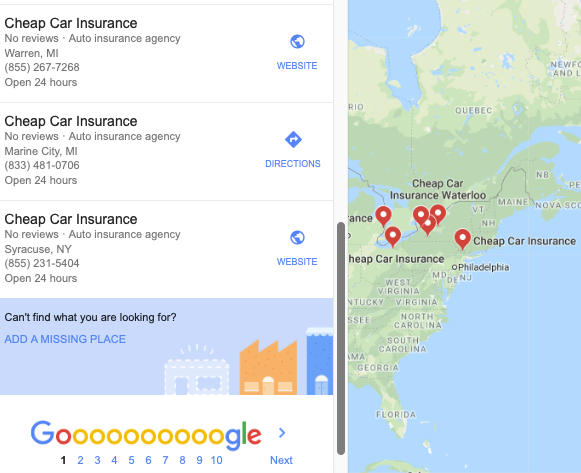
In 2009 I met with the then head of Google Local, Carter Maslan, and asked why they allowed so much spam to continue to exist in Maps after they were alerted to it. He assured me that it wasn’t very visible and it was being used to “inoculate the system” against future abuses.
The Disease
He spoke as if it was just a simple case of the chicken pox and the vaccine was already in hand.
Well, it turns out, more than 10 years later that spam in Local was more like the Spanish Flu pandemic of 1918* and the vaccine is still in the labs. And people are dying.
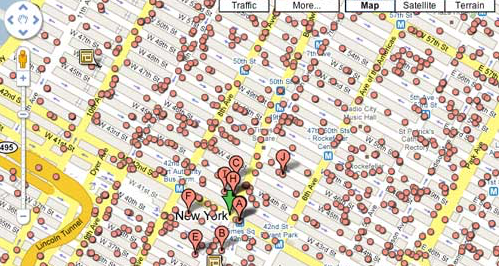
OK people are not dying but Google Local is. The scale and scope of lead gen spam in Google Local could be fatal to consumer trust.
Who knows when Rank Brain will come out of its coma to solve the issue and truly vaccinate the system.
The Evidence
A case in point is a lead gen network that I have written about AND reported to Google both via the normal reporting mechanism as well as filing a detailed report via Twitter*.
Problem is, either they didn’t believe me or else they can’t or won’t do anything about it, because it still exists at quite large scale.
If you search for “Cheap Car Insurance” or “Cheap Auto Insurance” or “Cheap Insurance Quotes” in just about any city in the US you will find numerous listings from this network*.
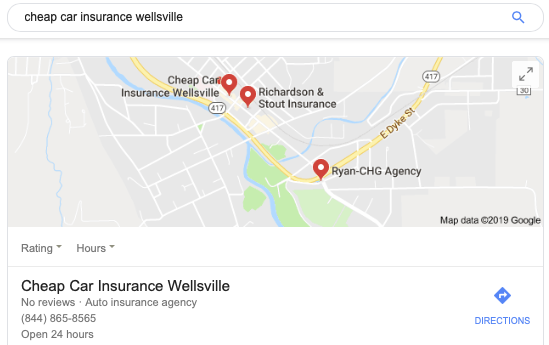
When you dial any of the listings you are put through to a sophisticated automated call tree that asks the same qualifying questions each time:
- if you already have insurance or no
- if you have been continuously insured for 12 months or no
- what is your zip code
- which insurance carrier you currently have
Based on the answers the system sends you along to an insurance agent that can sell you a competing product. The idea is that if you already have Allstate and are calling for “cheap car insurance” you must want a different brand.
I have dialed dozens and recorded several and the call tree is exactly the same for all of the listings.
The only thing that changes is that, depending on the zip you are in and which insurance you have, you will be forwarded to a different “local”* agent as a “live lead”.
You can hear a sample of that call tree that occurs on every one of the spam listings in Google Local here:
The Scope of the problem
I have identified hundreds listings associated with this particular vertical lead gen network at Google. There are multiple keyword based listings in many markets and coverage is country wide.
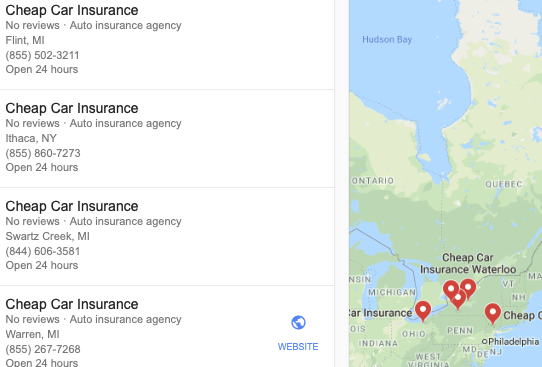
Given the Google Local predilection to return “branded” search results, front page visibility is quite high in many markets.
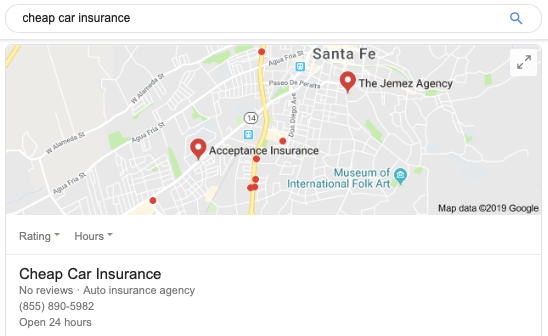
And clearly, Google is not the only service being spammed as these listings are common in Bing as well.

How it works
Essentially, it is a live lead generation service. Unlike lead gen that involves a form and follow up, this puts the searcher directly in touch with a business that has an interest in servicing the immediate inquiry.
In speaking with several of the agents on the other end, they are only charged if they accept the call. If a call is less than 2 minutes in length, they are charged for it but can request credit. If the call is not answered it goes on to the next agency in the lead generator’s queue.
Generally these agencies say that the lead quality is fair. Given the search term “cheap car insurance” it is no wonder.
According to the company that is selling these leads, close rates run from 30-50% depending on whether the agency is a national brand or a local agent and whether they are “transactional’ in their approach and properly qualify the caller.
The cost of the lead is $42 for an insured auto driver and $35 for an uninsured one. If an agent in fact does close 50% then it could cost as little as $84 to sell a single policy. In speaking with an agent at the end of the line, it would appear that the close rate is not that high. If the close rate is in the more likely 30% range* it would put the cost of selling a single policy closer to $125 under the program.
From the point of view of the lead gen company its a good deal as there is obviously zero acquisition cost on Google Local spam.
According to their sales rep, they have “from 30-50 different campaigns from publishers through various mediums to drive consumers to call a phone number.” And we know that at least two of those “publishers” are spam networks on Bing and Google.
I assume that worse case for the company behind this is that the Google Local spam dramatically drives down their costs even if they do actually have additional paid campaigns. And given that Bing Local spam is also being used, it is not clear how large a part of their profit spammy listings play.
Given the reach of Google Local, I assume that they make significant money by leveraging these fake listing calls.
Who is behind it
Clearly lead gen technologies can be outsourced to get all of the technologies needed to provide the service. VOIP phone numbers and call centers can all be assembled from a range of outsourcing companies for a solution. That being said in most other cases of Google Local lead gen that I have examined you find human call centers answering for the spammy listing.
But in this insurance case, the call tree technology is somewhat distinctive and seems to point to a single company. The company was identified by one of the insurance agents I spoke with and the specific call tree technology I experienced was confirmed by the company’s sales rep in a subsequent conversation.
When I asked the lead gen company’s sales rep about the use of Google Local for lead gen she assured me that it was a paid ad. I took the time to show her the spam, which temporarily slowed her down and lead her to pause but she quickly recovered and moved on with her sales effort. While she recognized it as spam, it is not clear how much she knows about her company’s “efforts” in this arena.
On this company’s website they note that they also provide lead generation services for medicare supplement, home security, rehab and the mortgage industries. I have yet to find any examples of these industries that have similarly spammy listings using this same call technology but it bears investigation. The rehab industry is not known for fair play.
Who is really behind it?
The one question that isn’t yet answered is whether this particular lead gen company or any of the ones that we have been seeing create their own local spam or whether that is outsourced to companies that specialize in generating these listings at scale.
It seems to me that someone, somehow has figured out how to insert these listings into Google at scale. Whether it is through a rogue employee working for one of the companies that is white listed to add listings or a rogue contractor for Google or a criminal element this is currently unclear.
What is the harm?
Someone on Twitter asked me if there was in fact any harm to this technique since the customer got an insurance quote and a local agency somewhere got the business.
I would contend that the harm is in fact significant.
First and foremost the consumer is being deceived. They are looking for an agency in their town, city or suburb and are then being pre-qualified and shunted off to the highest bidder. It is deceptive advertising at best. In reality it is more like a two sided marketplace where the buyer and seller are clueless to the actual con that is taking place .
Secondly, local businesses that deserve and need the exposure of the Google Local pack are being pushed out of view and losing valuable opportunities that Google Local promises.
These harms are palpable and don’t speak to the larger potential harm that is being done to erode trust in the whole of the local ecosystem.
All the while the lead gen company is taking its receipts to the bank* and Google sits doing little about this problem. Essentially both companies have externalized the costs of this problem to the unsuspecting consumer and other businesses.
Footnotes:
* It is estimated that about 500 million people or one-third of the world’s population became infected with this virus. The number of deaths was estimated to be at least 50 million worldwide with about 675,000 occurring in the United States.
* Google may have removed a few of the listings that I passed their way but removing a few and ignoring the obvious pattern is definitely akin to the boy with his thumb in the dike. As a volunteer, life is not long enough to send them hundreds and hundreds of links when they could easily user their tools to surface these.
*These searches, “Cheap Car Insurance” or “Cheap Auto Insurance” or “Cheap Insurance Quotes” only produce results on the desktop and then sometimes need to be re-zoomed or re-created. They will not work on mobile.
*Local is a stretch. Many of the listings are situated in rural communities but the agencies picking up the calls are typically larger agencies hundred of miles away
*30% is still high for a lead gen service and the real time search and answer nature of the process can explain that
*I estimate that there are at least 500 insurance listings from this particular network. Although there could be more. Any one call is a marginal incremental cost to the company. If you estimate that each of these 500 locations generates 10 calls a month at $42.00 that comes out to $252,000 year. Not a bad return. If you multiply that by the number of industries they might be in, things really start looking up.
© Copyright 2025 - MIKE BLUMENTHAL, ALL RIGHT RESERVED.
Comments
23 Comments
I can only imagine this is related to flood of robocalls that I get related to insurance. What a scam. Great job digging into this, can’t imagine those phone calls were fun.
People fall for these scams all the time. I really hope Google increases the standards or maybe even charges for a listing. Although most will likely pay the fee if a lead is $85.
Truth be told, I had a blast calling these folks…
Brilliant sleuthing Inspector Blumenthal, lolz. What did you just uncover?
…and so it continues, and grows, and what will this all lead to? I’ve come to the conclusion that Google is aggressively working on a solution… or just doesn’t give a $&(! I have to believe it’s the former rather than the latter.
Great read! Happy to see something new coming to the marketplace that will make all of these services become obsolete. #TrustMatters #CrossConnect #MicroInfluencers
Just wow. You did an amazing job digging deep into this scam and laying it all out. Very helpful.
It’s definitely a given that multiple parties are harmed in this scenario, mostly small companies who are getting pushed out of the listings. Horrible.
My question… how do you verify the scam listings that aren’t so blatant with their business name spam? Usually is use the website to fix the name if they have a spam name. Do you just report listings that look overly spammy or so you actually call to verify the spam before reporting?
@Jorge
There are a number of things you can do to validate whether a listing is spam
– Look at streetview
– Look for patterns of abuse that are consistent across multiple listings
– Call the number and ask where they are located
– Check with the state licensing authorities
– Check the domain DNS records to see if you can source the original person responsible to see if there is a pattern
As to how much effort you put into validating your spam claim, that is up to you. I am more interested in uncovering large scale abuses so I will identify spam by one or more of the above methods, craft a search that brings them into visibility, match the pattern of abuse and then do a sampling of calls to the locations to see if they all go to the same call center before i report.
I realize this is a ridiculous tin-foil hat conspiracy theory, but the thought popped into my head, and it’s fun to conspiracy theorize.
Why isn’t Google doing anything, and why haven’t they ever done anything?
1) Maybe they’re not fixing the problem so they can learn from the leadgen spammers as they build their own version of this kind of lead gen in Local.
2) Even more preposterous, and I really don’t believe it to be likely, maybe they have opened the gates to this company and they are taking a cut.
Maybe they learned how to implement the service ads from observing these lead gen scams
That’s the originating place for who they offer it to and how they offer it.
Or they leave it because it forces more local businesses to pay to play because they are no longer getting organic leads. This I sincerely believe is a high possibility
@darren
Dam dude, you are in the running to win that Tin Foil Crown from Mihm!
Haha. Nah, no one will ever take the Tin Foil Crown from Mihm.
@Darren: After Google killed the “content farm” websites around 2011, CBSLocal.com (ie denver.cbslocal, Chicago.cbslocal) started creating local BS content crap that flooded major urban regions on the cbslocal sites. Sites would rank high for searches such as “best dance classes Pittsburgh” “best tacos Dallas” and several thousand other phrases repeated in every major US market (sorry, I didn’t check Canada). The CBSlocal sites had tons of Google ads.
For the first year to 2-3, the cbslocal sites dominated serps.
You can still find the CBSlocal sites in different cites. The garbage content is found in the “best of” tab. (or something like that).
I don’t think the idea is totally “tin foilish”. I think google and cbslocal gave it a run several years ago. That is my $0,02
BTW: Mike: Great reporting.
What do you think it would take for Google to seriously fight local spam??? and do so on a regular basis??? They seem to dip in and out of local spam fighting and have done so ever since Maps came out. Mostly they seem to gloss over it.
@Dave
Given the prominence and on-going nature of the problem, it would appear that Google will not willingly choose to work on the problem.
Thus the only path forward that I could see having an impact on this would be a change of laws and increased government regulation.
Clearly, self regulation is not working
…..Yeah….break up the goliath.
(now if only I knew how to do that)
@Mike:
In terms of the word prominence; your research showed how prominent spammy listings can show for any one search.
On a different level, going back to what Carter Maslan said in 2009, we don’t know how often searches are made that generate the egregious spammy results.
I took a quick look at a list of current GMB categories and came up with almost 4,000 in US English.
Relative to the entire volume of searches and the subset of local searches any one spammy result might be so tiny in volume that it doesn’t register as significant to google nor does it generate enough outside publicity to embarrass google to act.
Now if you could get someone with a significant public persona to highlight the issue that might work.
How about Stormy Daniels??
I am sure that you are right and any given search doesn’t generate much visibility…and I am sure that Google’s statistical analysis shows that to be the case. And I am sure that a more public accounting might get some action.
1-That doesn’t make it any less criminal.
2- We have seen that statistical models tend to undercount the severity of the problem.
3- Getting Google to solve the “Cheap Car Insurance” problem might get solved with more publicity.
4- But if Google doesn’t solve the bigger problem then will all suffer and Google’s tendency in these matters is to paper over the specific problem to distract us.
Thanks for the detailed report on this critical problem. Do you think Google still reads your blog? The absence of even minor fixes to this problem suggests that either: No one is piloting the plane, or the conspiracy theorists are 100% on to something. Weren’t the GMB folks at LocalU Advanced in Santa Monica? What did they have to say about this?…..Meanwhile this problem is mushrooming across many categories since people have learned that it pays to cheat. What a bummer, eh?
@Jeffrey
I think that they just have other fish to fry. And that this falls to the bottom of the heap. Where “there ain’t no one wachin'”.
One thing I have noticed about the lead gen platforms we’ve come across is many of them are based in Utah in addition to many call centers. Not sure if this a cottage industry in that area. Many of them have contacted our clients directly which means we have to spend time explaining why it’s not a good idea. It’s always the head of sales that is most difficult to convince because they think they’ve stumbled across some new service that’s going to save the company money.
Thanks for the tip. I haven’t noticed much spam as yet, but it’s useful to know how to avoid it
True, people aren’t dying because of the spam plague. However businesses are. Honest businesses that support families and local communities. People of all ages, skills & stages of work experience are losing jobs. Businesses that comply with the guidelines (and the law) and have been operating for 15 years or more are failing.
The few businesses that can afford it to survive, turn to Adwords.
That’s my “conspiracy theory”. It’s not a conspiracy, it’s a conflict of interest ($) and the $ are winning.
…I wrote more but realised it was turning into a rant…
We can speculate all day long about why Google is not effective at stopping this sort of thing. Without evidence, it’s all just circumstantial. However, it’s probably helping them to sell more ppc advertising while this is going on, further down in the SERPs.
Comments for this post are closed.